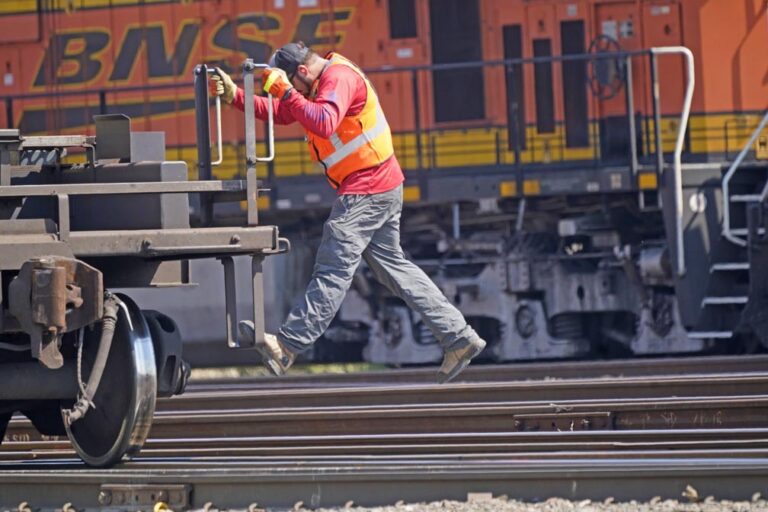Commuters, food producers, refineries and others could all be affected if there is a nationwide rail strike at the end of this week.
Members of one union rejected a tentative agreement that their leaders had negotiated with the biggest freight railroads, and three other unions were still at the bargaining table on Wednesday. Two other rail unions ratified deals.
The Biden administration was putting pressure on railroads and unions to settle their differences and avert a strike. In case that didn’t work, the administration was also working on a plan to use trucks and planes to move goods that are normally carried by freight railroads.
Business groups told Congress to step in and block a strike.
Here are key things to know ahead of a possible strike this Friday.
HOW DID NEGOTIATIONS GET TO THIS DIRE POINT?
The nation’s biggest freight railroads began negotiating with a dozen different unions representing about 115,000 workers in late 2019, but talks were slowed by the pandemic, which limited face-to-face meetings.
Government mediators tried to broker agreements, but that didn’t work. President Joe Biden then appointed a presidential emergency board, which held hearings and issued recommendations last month that included 24% pay raises and thousands of dollars in bonuses.
Many of the unions have reached tentative agreements with the railroads, but two large unions representing engineers and train conductors have held out for better terms on working conditions. Workers represented by the machinists’ union rejected a deal negotiated by their leaders, although that union agreed to delay any strike until Sept. 29. Two other unions — the Transportation Communications Union and the Brotherhood of Railway Carmen — voted to ratify their contracts Wednesday.
WHEN CAN WORKERS STRIKE?
By federal law, the unions can’t legally strike until after Friday morning, just after midnight. That’s when a 30-day “cooling-off” period ends, under terms of a law called the Railway Labor Act, which governs contract talks in the railroad and airline industries.
CAN A STRIKE BE BLOCKED?
Congress could intervene and block a strike or lockout, as it has done in previous nationwide rail-labor disputes, but it’s not clear whether that would happen this time.
Lawmakers are divided over a resolution to the dispute. Republicans want to impose the presidential emergency board’s terms, while Democrats prefer to let negotiators for the railroads and the two big unions keep talking.
WHAT ARE THE BIG ISSUES?
Rail workers stayed on the job throughout the pandemic but have not received a raise since 2019.
The unions sought raises of 31% over the five-year term of the new contracts, while the railroads offered 17% before the emergency board’s recommendations. The largest railroads endorsed the board’s middle-ground proposals, and most of the unions have reached tentative agreements based on those details.
However, the Brotherhood of Locomotive Engineers and Trainmen, and the transportation division of the International Association of Sheet Metal, Air, Rail and Transportation Workers, which represents conductors, have held out in hopes of better terms including provisions on working conditions.
The major railroads have cut nearly one-third of their jobs in the last six years, and unions say that’s making the work of their members harder. They want railroads to ease strict attendance policies that make it difficult to take time off for things like doctor appointments.
HOW WOULD A RAIL STRIKE AFFECT THE COUNTRY?
Railroads such as Union Pacific, BNSF, CSX and Norfolk Southern carry cars, coal, chemicals, grain, imported goods and other products and raw materials throughout the country. A shutdown — even a brief one — would delay critical shipments and ripple across the economy.
The Association of American Railroads trade group estimates that a strike would cost the economy $2 billion a day. The Business Roundtable says a strike would be an “economic catastrophe.”
WILL IT IMPACT FUEL SUPPLIES?
About 300,000 barrels of crude oil is shipped by rail every day, and refineries might have to slow production if deliveries are delayed, according to the American Fuel & Petrochemical Manufacturers. Analysts warn there could be shortages of gasoline and diesel in some places such as the Northeast.
WHAT ABOUT NEW CARS?
Most new vehicles are shipped from the factory or dock by rail, and analysts say there is not enough truck capacity to handle all those vehicles in case of a strike. That would mean even longer wait times for dealers and motorists to get their hands on new cars.
A strike could also interfere with production because automakers receive some parts and raw materials by rail.
WILL SOME STORE SHELVES BE BARE?
The railroads have announced plans to stop shipping refrigerated items ahead of the strike deadline, so there could be disruptions in deliveries of produce, meat and other items.
Food producers could be affected too, leading to longer-lasting effects. Agricultural groups say that even a brief strike would interrupt shipment of feed to livestock and poultry producers.
WILL A STRIKE AFFECT PASSENGER RAIL?
Yes. Amtrak announced that all long-distance trains have been canceled starting with Thursday’s schedule. The passenger rail service had already suspended the California Zephyr and Empire Builder lines that run from Chicago to the West Coast and announced plans to shut down several others.
Amtrak uses its own track in much of the corridor from Washington to Boston, but almost everywhere else it relies on freight track that could be closed during a strike even though Amtrak and its workers are not involved in the negotiations.
Around the country, some local commuter rail lines also depend on tracks owned by the big freight railroads. The Chicago area’s Metra commuter line said that if there is a strike it will suspend operations on four of its 11 lines on Friday.
COULD THERE BE POLITICAL FALLOUT?
The White House is clearly worried that any disruption in supply chains just weeks before the November midterm elections could anger consumers, who are already facing the highest inflation in 40 years. That could hurt Democrats, who are trying to protect razor-thin control of the Senate and House.
Republicans will blame Democrats if there is a strike and Congress fails to stop it.
“This has been negotiated for three years. It’s time that it ends,” said Sen. Roger Wicker of Mississippi, the top Republican on the Commerce Committee.
Democrats, however, are hesitant to stand in the way of unions trying to get a better deal for their members, and they say Congress should not try to tip the scales in negotiations.
White House press secretary Karine Jean-Pierre said the administration has told the railroads and unions that American families, business and farms would suffer. She said a strike is “not acceptable.”
The Associated Press is an independent global news organization dedicated to factual reporting. Founded in 1846, AP today remains the most trusted source of fast, accurate, unbiased news in all formats and the essential provider of the technology and services vital to the news business. The Trucker Media Group is subscriber of The Associated Press has been granted the license to use this content on TheTrucker.com and The Trucker newspaper in accordance with its Content License Agreement with The Associated Press.











